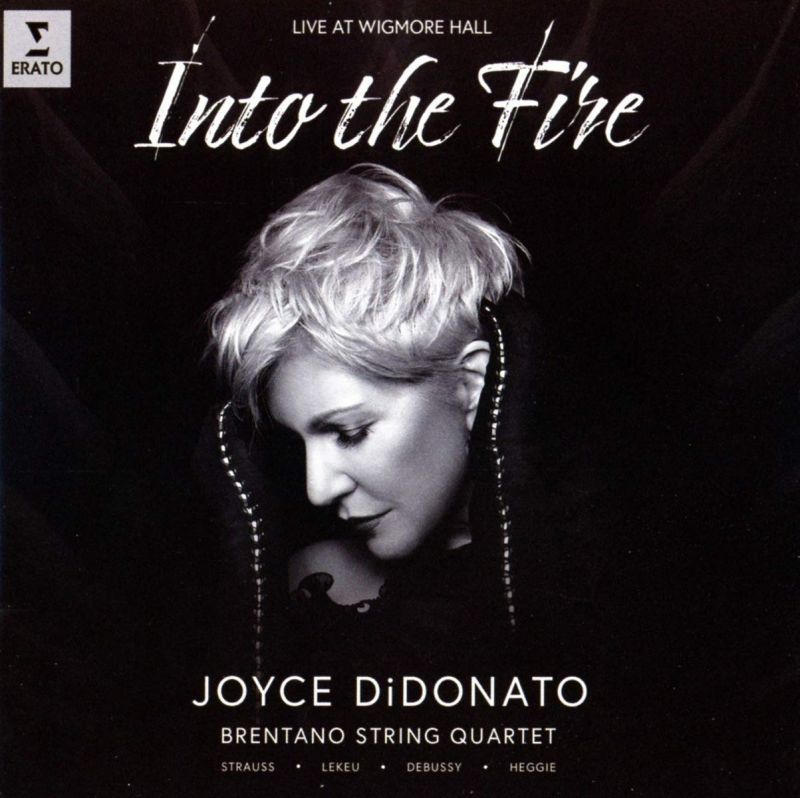Joyce DiDonato: Into the Fire
View record and artist detailsRecord and Artist Details
Composer or Director: Richard Strauss, Guillaume (Jean Joseph Nicholas) Lekeu, Franz (Xaver) Gruber, Claude Debussy, Jake Heggie
Genre:
Vocal
Label: Warner Classics
Magazine Review Date: 10/2018
Media Format: CD or Download
Media Runtime: 78
Mastering:
DDD
Catalogue Number: 90295 64219

Tracks:
| Composition | Artist Credit |
|---|---|
| Schlichte Weisen, Movement: No. 2, Du meines Herzens Krönelein |
Richard Strauss, Composer
Brentano Quartet Joyce DiDonato, Mezzo soprano Richard Strauss, Composer |
| Schlichte Weisen, Movement: No. 1, All' mein Gedanken, mein Herz und mein Sinn |
Richard Strauss, Composer
Brentano Quartet Richard Strauss, Composer |
| (8) Lieder aus Letzte Blätter, Movement: No. 3, Die Nacht |
Richard Strauss, Composer
Brentano Quartet Joyce DiDonato, Mezzo soprano Richard Strauss, Composer |
| Schlichte Weisen, Movement: No. 3, Ach Lieb, ich muss nun scheiden |
Richard Strauss, Composer
Brentano Quartet Joyce DiDonato, Mezzo soprano Richard Strauss, Composer |
| (3) Lieder, Movement: No. 1, Traum durch die Dämmerung |
Richard Strauss, Composer
Brentano Quartet Joyce DiDonato, Mezzo soprano Richard Strauss, Composer |
| Molto adagio |
Guillaume (Jean Joseph Nicholas) Lekeu, Composer
Brentano Quartet Guillaume (Jean Joseph Nicholas) Lekeu, Composer Joyce DiDonato, Mezzo soprano |
| (3) Chansons de Bilitis |
Claude Debussy, Composer
Brentano Quartet Claude Debussy, Composer Joyce DiDonato, Mezzo soprano |
| Camille Claudel: Into the Fire |
Jake Heggie, Composer
Brentano Quartet Jake Heggie, Composer Joyce DiDonato, Mezzo soprano |
| (4) Lieder, Movement: No. 4, Morgen (wds. J H Mackay: orch 1897) |
Richard Strauss, Composer
Brentano Quartet Joyce DiDonato, Mezzo soprano Richard Strauss, Composer |
| Silent Night |
Franz (Xaver) Gruber, Composer
Brentano Quartet Franz (Xaver) Gruber, Composer Joyce DiDonato, Mezzo soprano |
Author: Edward Seckerson
Most strikingly, DiDonato and her collaborators here – the Brentano Quartet – carry the colour of voice and string quartet through the recital via familiar Strauss arranged by Mark Steinberg and Misha Amory (violinist and viola player of the Brentano four) and Debussy’s Chansons de Bilitis, arranged by Heggie himself. And the highest compliment I can pay all three of the arrangers is that it sounds as if those songs were conceived and swathed this way all along.
Strauss’s ‘Die Nacht’ is more of a shroud, it has to be said, DiDonato receding into its mystery and apprehension through an ever-whitening sound. Wigmore Hall encourages intimacy in her Strauss, her departure into ‘the land of love’ at the close of ‘Traum durch die Dämmerung’ (‘Dream in the Twilight’) magically invoking the ‘soft blue light’ which is all but visible in the closing chords.
But whose decision was it to retain applause at this point, where for the purposes of home listening a natural and breathtaking segue could have been achieved from the Strauss into the Belgian composer Guillaume Lekeu’s Molto adagio sempre cantante doloroso – a passionate elaboration on the words from Matthew’s Gospel, ‘My soul is exceedingly sorrowful, even unto death’ written when he was a mere 17 and only a handful of years away from death himself. There is profound kinship here with Camille Claudel, the hapless heroine of Heggie and Gene Scheer’s piece.
And Heggie plainly saw the curvaceous Frenchness of the Debussy songs as the perfect portal into his own cycle, possessed as they are of a shifting light that is entirely sculptural. Again, though, ruinous applause violates the atmosphere at the close.
In celebrating the tragic but significant life of the sculptor Rodin’s mistress and kindred spirit Camille Claudel, Heggie has found a music which is in perfect harmony with the way in which Claudel’s sculptures move, or rather dance. His great gift (as I have reiterated several times in these pages) is for finding the natural music of words and here he does so in an especially seductive and danceable way.
The erotic reverie of the opening song, ‘Rodin’, encapsulates Claudel’s conflicted feelings, at once sensuous and anxious. Love and regret. The theatrical climax in which she effectively shouts his name is immediately silenced by the sound of her speaking it once more – hushed and ambivalent. DiDonato catches that ambivalence perfectly. A feverish ‘La valse’ hearkens back to Debussy, who knew Claudel (though quite how well is a matter for speculation) and kept a copy of her famous sculpture of that name in his studio. Most heartbreaking of all is the lullaby, ‘Le petite châtelaine’, for Claudel’s aborted child.
She ended her life in an asylum and the inspired little scena which concludes Into the Fire recalls a visit Claudel received there from Jessie Lipscomb, an English artist with whom she had once shared a studio. ‘Every dream I ever had was of music’, Claudel tells her friend and Heggie’s music, with its hypnotic repetitions, underscores that sentiment just as it has done from the very start. This is a wonderful calling card for DiDonato. Small wonder she has become something of a muse for Heggie.
The applause at last feels appropriate and DiDonato’s two encores – Strauss’s ‘Morgen’ in another arrangement by Steinberg (where DiDonato doesn’t sound entirely comfortable to my ears) and a seasonal greeting (it was December 21) in Franz Gruber’s ‘Silent night’ (arranged by the Brentanos) – are still mindful of the evening’s dramatic turns.
Discover the world's largest classical music catalogue with Presto Music.

Gramophone Digital Club
- Digital Edition
- Digital Archive
- Reviews Database
- Full website access
From £8.75 / month
Subscribe
Gramophone Full Club
- Print Edition
- Digital Edition
- Digital Archive
- Reviews Database
- Full website access
From £11.00 / month
Subscribe
If you are a library, university or other organisation that would be interested in an institutional subscription to Gramophone please click here for further information.




